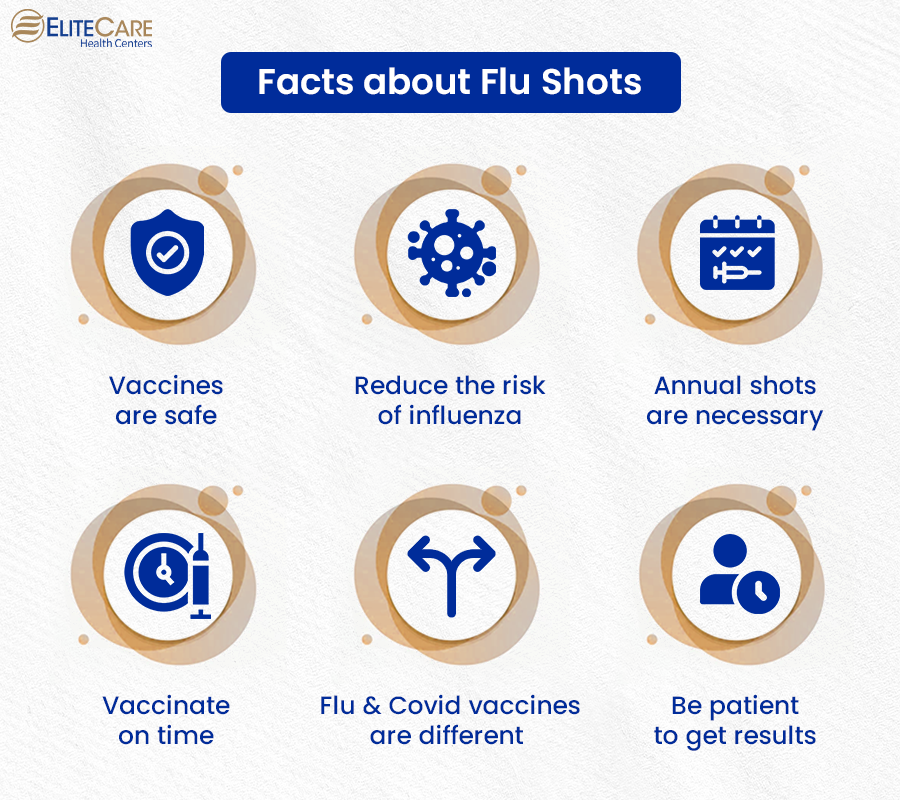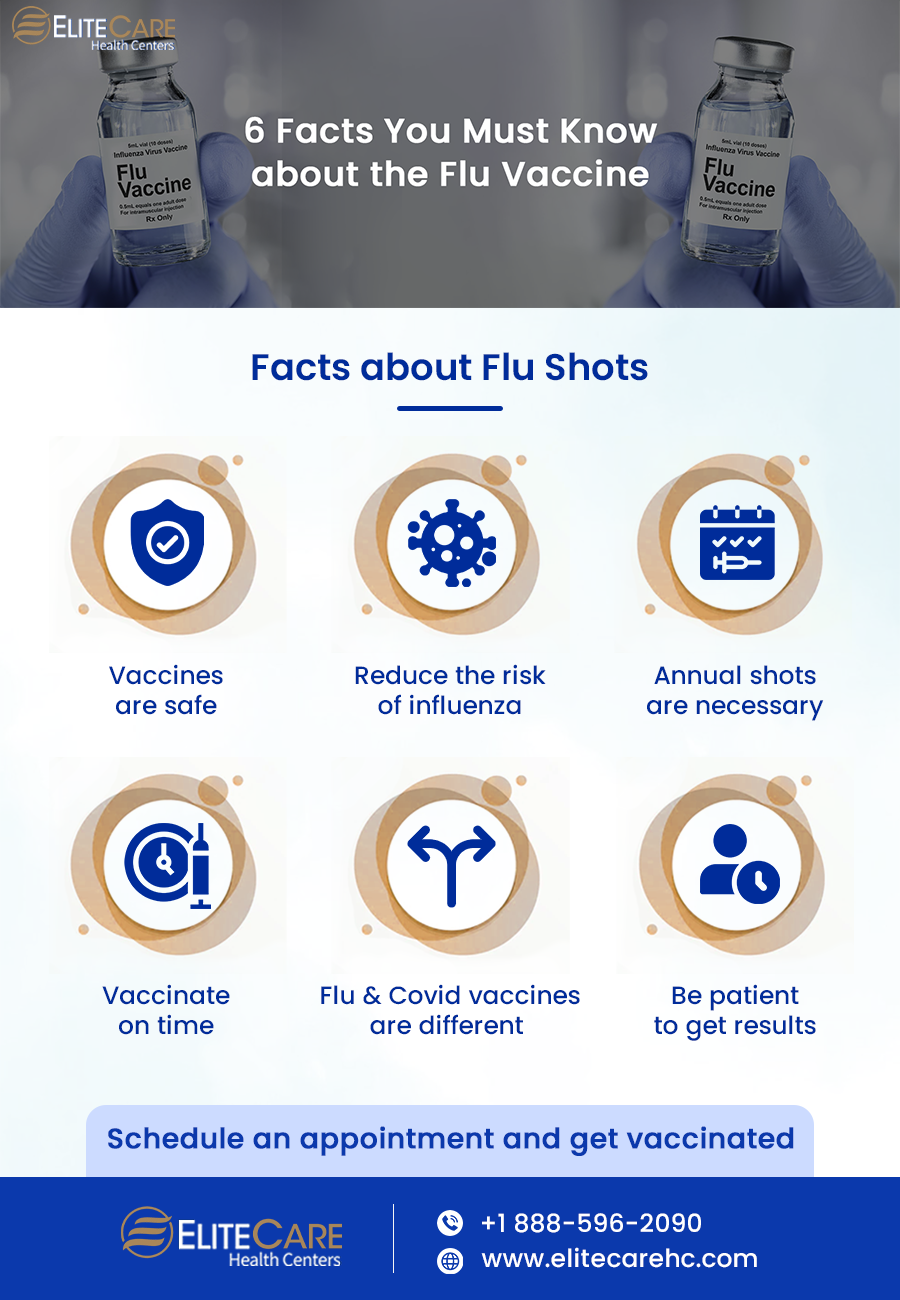
Every flu season is different, and influenza infection affects people differently depending on their age and pre-existing medical conditions. It is especially critical for the elderly due to their weakened immune system and underlying chronic conditions. Flu shots are recommended to avoid severe flu-related complications and hospitalization. According to the latest CDC report, vaccinations helped prevent around 3.7 million influenza-associated medical visits, and 105,000 influenza-associated hospitalizations in the United States during the 2019-2020 season.
The Covid-19 pandemic adds to the need for flu vaccination in order to reduce the strain on hospitals. Furthermore, the flu can weaken the immune response of older adults, making them more susceptible to the COVID-19 virus.
Facts to Know about Flu Shots

Preventing flu in the elderly with the help of flu shots is better than treating it. Before scheduling an appointment to get a flu shot, clarity about the vaccine is crucial. Here are the top 6 facts about flu vaccines.
1. Vaccines are safe
A popular myth about the flu vaccine is that it contains a live virus and can infect the human body. But the vaccine contains either inactive, non-infectious strains of influenza A and influenza B viruses (Flu viruses) or a particle that looks like a flu virus to the immune system. As soon as the vaccine is injected, it triggers an immune response in the body. Further, the immune system builds antibodies and prepares the body to fight flu viruses.
Experiencing some mild side effects is normal after getting vaccines. But flu vaccines can never cause death or extreme health complications. The side effects include,
- Soreness, redness, swelling at the injection site
- Fever
- Headache
- Nausea
- Muscle cramps
2. Reduce the risk of getting influenza
Influenza A and influenza B strains are complex and constantly mutating. Although rare, it is possible for vaccinated individuals to contract the virus.
Nevertheless, avoiding vaccination is not an alternative option. Vaccination reduces the risk of contracting influenza and illness associated with flu by 40% to 60% Older adults have weakened immunity and are more prone to getting the virus from carriers who may not show any symptoms. Vaccination immunizes the elderly and helps their body to fight the flu. It also minimizes the additional health issues they can develop after getting infected with the flu.
3. Annual shots are a necessity
Viruses are ever-changing, and ever-mutating and flu viruses are no exception. The previous vaccines are probably ineffective and cannot target the newly mutated strain. For that reason, a new vaccine is developed each year, keeping the new variations in mind.
Hence, last year’s flu shots are ineffective against the newly emerging strains. One flu vaccine is not enough to protect against every type of seasonal flu. 2021-2022 flu vaccines were quadrivalent, designed to protect against four different strains of the flu.
4. Vaccinate on time
Schedule an appointment for vaccination as soon as the new and upgraded vaccine is available. Flu is most prevalent from mid-fall to late spring. But in general, flu outbreaks can happen at any time. Hence, delaying the vaccination means pushing the elderly to additional health risks. Immunize them on a priority basis, preferably before the flu season.
Generally, the Centers for Disease Control and Prevention (CDC) finalizes and files the recommendations for the annual flu vaccines in August every year. The vaccines are usually available in early September, and people can get them till March.
5. Flu and Covid vaccines are different
Although the symptoms of Covid-19 and the flu are relatively similar, the viruses causing these illnesses are different. Therefore, taking one of these two vaccinations does not guarantee protection against the other.
Besides, it is possible to contract both of these viruses at the same time. So, take flu vaccines and Covid-19 vaccines timely to avoid further complications. It is safe to get both vaccines on the same day as well.
6. Be patient to get results
It is possible for a person to contract flu within a few days of vaccination because flu vaccines take at least two weeks to become effective. The immune system requires time to build enough antibodies to fight the virus. Unfortunately, if the patient gets exposed to flu viruses before vaccination or within the next two weeks, the risks of getting sick become higher.
Read More: The Importance of Health and Wellness
Conclusion
Flu vaccines are critical to protect and prevent the further spread of the virus. Therefore, it is the responsibility of every individual to ensure that they receive their vaccination on time. The CDC updates the dosage recommendations for different age groups periodically on its website. Due to underlying health conditions and weakened immune systems, the requirement for a more effective flu shot for the elderly is recognized. As a result, the CDC and the Advisory Committee on Immunization Practices (ACIP) have recommended a higher dose and adjuvanted flu vaccine for the 2022-2023 flu season, specially designed for people aged 65 and older.






